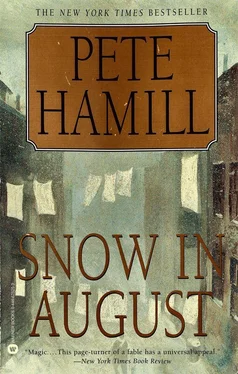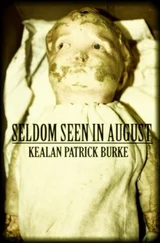“Almost nobody to this synagogue comes anymore,” the rabbi said, waving a hand. “The Jews from around here? Dead. Moved away.” That was why the upper sanctuary was kept closed, its doors locked and sealed. Michael had never seen it. “We have services there? Everybody is lonely. And another thing: we don’t have the money to heat it up.” Most of the congregation now was composed of older people, he said, who could not come easily to synagogue through the snow. “About Florida they are thinking more than about God,” the rabbi said, “and who blames them?” He worried, he told the boy, that some Shabbos he would not have a minyan. The Tradition insisted on a minyan — a minimum of ten males — before worship could begin. “Nine men and one woman? Not enough. Not even one beautiful, intelligent woman. An old man with no teeth and a very little brain is okay, but not a woman. Sometimes…”
He sighed in the face of God’s mysterious ways. Years ago, before Rabbi Hirsch came to Brooklyn, the upstairs sanctuary had been filled. “The old people telled me this.” There were services on Wednesdays too, and the synagogue was packed all day on Saturdays. “How wonderful it must have be. Like Prague when I’m a boy. Now? Not so wonderful. Not in Prague. Not here. I pray and pray but this does not become a house of the people. Not full of singing. Of praying. Of laughing. And you and me, we are the only ones who study.” He shook his head. “The rabbi and his Shabbos goy.”
Now Michael wandered to the back of the sanctuary, where double doors opened under the stoop on MacArthur Avenue. There were three locks and a plank wedged into two angle irons to keep the doors from being forced open from the other side. Hebrew tablets were cemented into the walls. And in the right-hand corner there was a narrow oak door.
“Where does this door go, Rabbi?”
“Upstairs.”
“Can I see it?”
“No, is closed,” the rabbi said. “Well, someday maybe.” Then he stopped, a book in his hand. “Ah, here is the book. Greenberg, Yossel.” He smiled. “Just like the Golem.”
Michael came over, his stomach suddenly queasy.
“What’s his name?”
“Greenberg.”
“That’s Mister G.”
“You know him?”
“I was there when he was beaten up.”
“You were there?”
“Yes,” Michael said, and then realized he might have said too much. He turned away.
“Is very sad story,” Rabbi Hirsch said. “His son writes to me a letter. He says his father is in — the word is coma? Yes. But maybe also he is given up on the life. He says Greenberg just lies in the hospital in the dark. The hospital, it don’t help. His head is broke and hurts all the time. Tubes are in his arms. They give him medicine. They feed him. But Greenberg never says nothing. The son, to me he writes a letter that says maybe his father’s old prayer book will help. The son, he says maybe the book will make Greenberg open his eyes.”
Michael remembered the old man holding his head, the blood slippery on his fingers, the cash register held in the air, the breaking sound when it landed, and the shards of broken glass and ruined Captain Marvels on the floor. He remembered Mister G lying in his own blood. He remembered Frankie McCarthy’s sneer. The rabbi stared at him.
“Did you tell the police who done it, this beating to Greenberg?”
“No.”
“Why?” the rabbi said softly.
“Ich vais nisht.”
“You don’t know why ?”
Michael tried to face the rabbi, but gazed instead at the walls and the low ceiling.
“I can’t tell the cops,” Michael said. “Around here, you don’t tell the cops anything. They’re like, I don’t know, the enemy. And I’m Irish, Rabbi. I talk to the cops, I’m an informer, and my mother says they were the worst people in Ireland.” He struggled for control, pushing the image of Mister G’s bloody face from his mind. “Around here, they call an informer a rat, or a squealer. I talk to the cops, and I get found out, they give me the mark of the squealer. They cut your cheek all the way to your ear, they—”
“You can’t tell the police in secret?”
“No! I tell them and don’t give my name, they do nothing. I give my name, they make me a witness, and then everyone knows my name. Look, I gotta go.”
He started to walk out past the low railing. The world was suddenly blurry. Michael trembled, afraid he would cry, afraid he was about to lose Rabbi Hirsch.
“Wait!” the rabbi called after him.
Michael paused, and the rabbi came to his side.
“I didn’t tell you go to the police,” he said. “I want just to know why you didn’t.” He paused. “Now I know. You’re, what’s the word? Scared.”
“Yes.”
“Of the man who did this to Yossel Greenberg?”
“Not just him.”
“Who else, then?”
“Everybody.”
“Your mother?”
“No.”
“Me?”
“No.”
“So there’s two people. Already we know it’s not everybody.”
Michael tried to smile, but his eyes were full of tears.
“Michael, you are a very good boy,” the rabbi said. “You are kind. You are a worker, I can see. But you are young. You have not already learn some of the hard things in the life. One very hard thing? You keep quiet about some crime, it’s just as bad as the crime.” He paused. “Believe me. I know.”
For two days, Michael walked on other streets to avoid the synagogue. The rabbi’s words moved in and out of his mind, even while he sat in classes at school. You keep quiet about some crime, it’s just as bad as the crime . He thought about talking it over with his mother. If he told the cops, would he really be an informer? He answered himself: Yes. Besides, if he talked, she’d be in trouble too. They might try to hurt her. They’d have to move. To go somewhere else. Maybe she’d even take him with her back to Ireland. Far from Sonny and Jimmy and games on the street and the Dodgers in Ebbets Field. Far from home. But suppose someone in Ireland heard about what he’d done? They might end up in even worse trouble.
At night, in his dark room, there was a jumble of images as he tried to sleep: Frankie McCarthy’s knife, Mister G’s broken head, Rabbi Hirsch’s steady gaze as he asked him to explain his silence. What was done to Mister G was a crime. No doubt about it. So what was his own silence? To get rid of the faces, he tried to conjure other images, from comics or movies. But Frankie and Mister G and the rabbi kept returning. And then Custer appeared in his mind, right out of the West, and he sat again with his father in the balcony of the Grandview, and wished Tommy Devlin could be there to tell him what to do.
Walking to school in the morning, he thought about what it would be like if he never saw Rabbi Hirsch again. He was certain the rabbi was disgusted with him. After all, Mister G was from his synagogue and he sure couldn’t afford to lose any more people. And maybe I can’t fix Mister G’s head, but I can help teach Frankie that crime does not pay. Just as the comic books said.
Except I can’t be a squealer. Can’t. I just can’t. But I don’t want to stop learning the rabbi’s language, or hearing his stories either. If I never see him again, it’s like finding half the pages in a book are blank. I need to know about Leah — how she died. And how he came to America, to Brooklyn. Maybe I can ask him all that, and then say goodbye and thank him for everything he taught me and tell him how sorry I am for the way it turned out. Yes. I have to see him. I can’t just disappear. I can’t be a coward.
That afternoon, after school, Michael knocked on the door of the synagogue. For a moment, he thought of running. But the rabbi opened the door and smiled broadly.
Читать дальше












